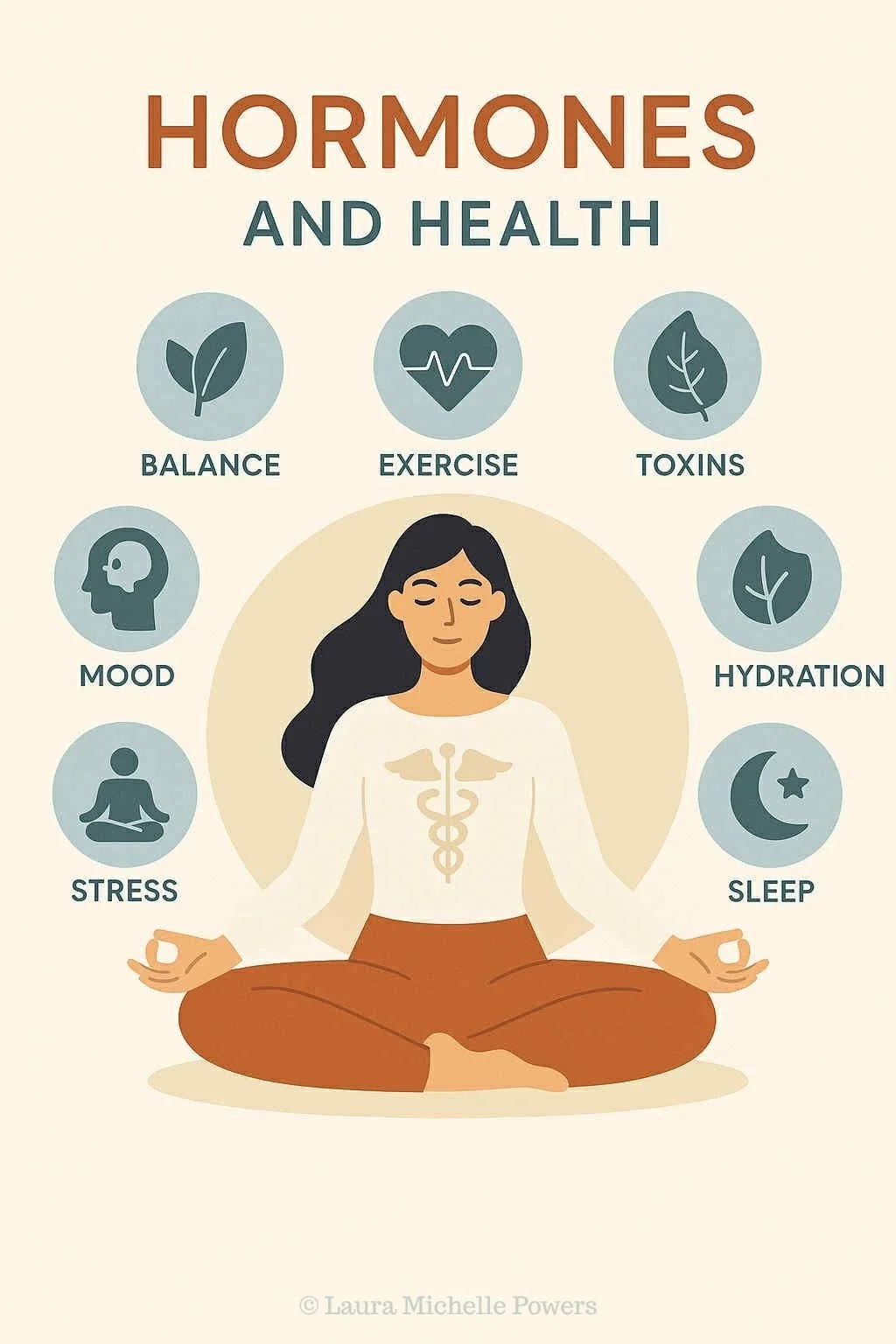Is it your Hormones?
/By Laura Michelle Powers: Celebrity Psychic, Author, and host of Healing Powers Podcast
How to Recognize Signs of Hormone Imbalance in Women
If you’ve been feeling off lately—moody, tired, bloated, or just not quite like yourself—it could be more than just stress or a busy schedule. You might be experiencing a hormonal imbalance, something many women go through at various stages of life.
The good news? Awareness is the first step toward healing. Your body is always talking to you—let’s learn how to listen.
What Is a Hormonal Imbalance?
Hormones are your body’s chemical messengers. They regulate everything from energy levels and mood to metabolism, skin health, sleep, sex drive, and even how your body handles stress.
A hormonal imbalance happens when there’s too much or too little of one or more key hormones—like estrogen, progesterone, testosterone, cortisol, insulin, or thyroid hormones. Even small shifts can create big changes in how you feel.
Common Signs You Might Have a Hormone Imbalance
Fatigue That Doesn’t Go Away
Even after a full night’s sleep, you feel drained or foggy throughout the day.
Hot Flashes or Night Sweats
These are classic signs of perimenopause, but they can also signal imbalances in estrogen and progesterone.
Irregular or Painful Periods
Heavy bleeding, skipped cycles, intense PMS, or period-related migraines are often tied to hormonal shifts.
Mood Swings, Anxiety, or Depression
Estrogen and progesterone deeply impact mood—imbalances can heighten emotional reactivity or lower your sense of joy and stability.
Trouble Sleeping
Low progesterone or high cortisol can make it difficult to fall or stay asleep.
Sugar Cravings and Weight Fluctuations
Insulin resistance, cortisol spikes, or thyroid imbalances can trigger strong cravings, bloating, or stubborn weight gain—especially around the belly.
Sudden Belly Weight Gain (Without Lifestyle Changes)
Many women notice unexpected weight gain around their abdomen or waist, even when their eating or exercise habits haven’t changed. This is often related to:
Cortisol imbalances (stress hormone)
Estrogen dominance
Insulin resistance
Low thyroid function (hypothyroidism)
If you’re noticing that your body is changing without a clear cause, it could be a sign your hormones need rebalancing.
Low Libido or Vaginal Dryness
A drop in estrogen or testosterone can lower desire and affect intimacy and connection.
Hair Loss or Skin Changes
Thinning hair, acne, or dull skin can be your body’s quiet way of asking for hormonal balance.
Symptoms by Hormone: Estrogen, Progesterone, and Testosterone
Estrogen Imbalance
Too Much (Estrogen Dominance):
Heavy or painful periods
Breast tenderness
Mood swings or irritability
Weight gain, especially in hips and thighs
Bloating
Fibroids or endometriosis
Anxiety
Too Little (Low Estrogen):
Hot flashes or night sweats
Vaginal dryness
Low libido
Dry skin
Memory issues or brain fog
Depression or low mood
Progesterone Imbalance
Low Progesterone:
Irregular periods
Short luteal phase (second half of cycle)
PMS (especially anxiety, sadness, or crying spells)
Spotting before periods
Headaches or migraines before your period
Sinus pressure or congestion during the luteal phase
Sleep troubles (especially waking in the night)
Increased anxiety or restlessness
Note: Progesterone has a calming effect on the brain and nervous system. When it drops too low before menstruation, it can trigger symptoms like mood swings, insomnia, and hormone-related migraines. Some women also report sinus-like symptoms or pressure due to hormonal shifts affecting inflammation and fluid retention.
Testosterone Imbalance
Too Much (Often in PCOS):
Adult acne (especially jawline or chin)
Oily skin
Excess facial or body hair
Scalp hair thinning or hair loss
Irregular periods
Deepening of the voice
Too Little:
Low libido
Reduced muscle tone or strength
Low motivation or energy
Brain fog or difficulty focusing
Mood dips or apathy
When Hormone Imbalances Often Appear
Puberty
Postpartum / After Pregnancy
Perimenopause and Menopause
After discontinuing hormonal birth control
During chronic stress or after trauma
Due to dietary, thyroid, or gut imbalances
Hormonal changes are natural, but imbalances don’t have to be your “normal.” Understanding your body’s rhythms can empower you to work with—not against—these cycles.
Ways to Begin Rebalancing Naturally
Prioritize sleep, rest, and nervous system support
Eat nourishing, hormone-friendly foods (think healthy fats + fiber)
Stay hydrated and reduce caffeine/sugar
Manage stress through breathwork, meditation, or movement
Consider testing your hormones with a trusted practitioner
A Note on Intuition
Many women feel that something is off long before labs confirm it. Trust your intuition. If you feel like your body is giving you signals—listen.
Final Thoughts
Hormones are powerful—and so are you. A hormone imbalance isn’t a life sentence. With the right support, lifestyle changes, and self-awareness, you can restore balance and vitality.
The first step is simply recognizing the signs. From there, you can explore healing with clarity, compassion, and confidence.

